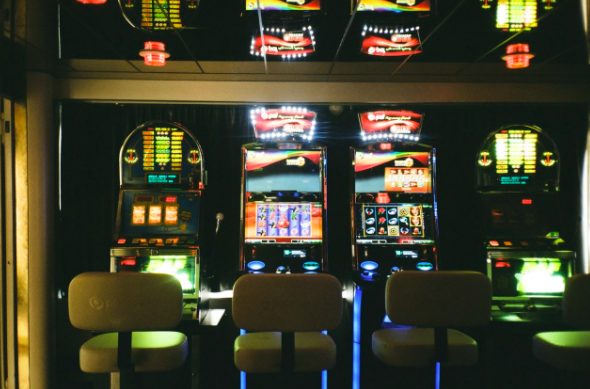
A slot machine is a piece of mechanical or electronic equipment or an electronic online simulator that is used for personal gambling. According to the Indian website https://casinosclub.in/ that reviews the best online casinos, slots are one of the most popular casino games nowadays. It attracts millions of players every day, but it was not always like that. The name is associated with the presence of a narrow hole on the front of the case of mechanical machines, into which the player lowered coins or chips bought in the casino. Modern online slot machines do not have any holes, they are replaced by a button on the display. There is a colloquial name for the one-armed bandit. The fact is that the first mechanical machines in the United States had a massive lever on the body that resembled a human hand. Devices began to be called bandits because of their ability to empty the pockets of excessive gamblers.
In different countries, the devices that create the game of chance are called differently:
- fruit machines or fruities in England, since fruits were depicted as pictures for combinations;
- puggy in Scotland;
- just the slots in North America;
- pokies in Australia and New Zealand.
The most common name in the world ‘slot machine’ comes from American English and is also used in the Indian gaming industry.
The History of Slot Machines
The first slot machine that produced combinations of a poker deck of 20 cards was created by the residents of New York Brooklyn Sittman and Pitt in 1891. The machine worked on five-cent coins, the bartender gave out the winnings in the form of a mug of beer, and the maximum jackpot was only half a dollar with three sevens in one line.
Four years later, the German immigrant Charles Fey improved the design by creating the famous Liberty Bell machine with three reels but with a much wider variety of pictures. In addition to the usual poker suits, there were stickers in the form of bells on the reels. If the liberty bells fell in a row, the game house paid out a much more substantial prize than in the case of the Sittman and Pitt machines. This attracted gamblers and raised the revenue of the houses. New devices began to be bought not only by casinos, but also by ordinary bars and saloons.
Interesting fact. Charles Fey arrived in San Francisco in 1885 at the age of 19 with tuberculosis. Doctors predicted a quick death for him. But after the invention of the machine, the health of the craftsman got better and he lived for 82 years (1862-1944). Charles Fey forever earned the honorary title of the father of slots.
Throughout the first half of the 20th century, the equipment remained mechanical, but it was continuously improved as well as the winning system. The winnings became equal to twice the initial bet, which intensified the excitement and always made it possible to win back if there was a supply of coins or chips. The slot machines were in great demand among men and women, bringing substantial income to casinos and bars. Methods of fraud have also appeared. Enterprising owners of slot machines deliberately removed pictures from the reels, reducing the likelihood of winning combinations.
In the mid-50s, first electromechanical and then completely electric technology appeared. The drum was rotated by an electric motor. This allowed us to increase the number of lines and options for winning combinations.
From Offline to Online

The newest generation of video slots was born in the 80s of the last century.
Computer technologies, which were quite primitive at that time, made it possible to realize video poker, which became incredibly popular among gamblers. Thanks to the built-in random number generator, the device laid out combinations automatically, which added confidence to the players in a fair game. Very quickly, the developers of electronic equipment added such new options as:
- payment of winnings directly through the machine without the participation of an administrator or bartender;
- automated acceptance of first cash and then credit cards;
- phone support.
There was no longer a mechanical limitation on the number of lines and their geometry on the display. The program allowed making a variety of bets with different odds from the classic doubling to multiplying by 100. There appeared networks of slots, connected through local distributed systems or via the Internet, in which the jackpot amount depended on the united bank throughout the network. Having made a large bet and having won, the player has a chance to grab jackpot hundreds of times larger than the size of the bet.
The natural next step on the path of gaming progress was the emergence of online casinos, not tied to a specific location, but accessible from anywhere in the world where there is Internet access. This became an outlet for players from countries where offline gaming is prohibited. In India, gambling is legal in only three states, Goa, Sikkim and Daman. Even virtual games are prohibited in two states (Andhra Pradesh and Telangana).
In traditional brick and mortar casinos, slots revenue is 70% of a house’s revenue. In the online industry, this share is slightly smaller, but also significant. The popularity is ensured by the simplicity of the rules of the game, the speed of the process, and the ability to immediately adjust and scale the bets. Players are attracted by a huge variety of games, excellent graphics and intuitive interface. Almost every week, the developers bring to the fans’ judgment the new video games based on the good old drum and the game of chance.
The Future Of Online Slots
Forecasts are a thankless task, especially since slot machines do not yet suggest any revolutionary improvement. Developers only create new plots for video games and improve the functionality of management, placing bets, paying out winnings.
There is no doubt that the trend will be the linking slots in communities and an increase of progressive jackpots. The opportunity to win a really significant amount of money attracts more and more gamblers to the spins.
Another trend is the apparent shift in gaming activity from desktop computers to handheld devices. Most of the users in India practically do not need expensive laptops and bulky desktops, so they go online and play from smartphones and tablets. The challenge of time for developers is the creation of high-quality mobile apps for the platforms that allow players to spin the reel and break the luck from devices running on iOS and Android.
In this case, the best option is not to download the mobile application manually (this option may be unavailable, for example, due to lack of free memory), but automatic download from the browser (apk). Slots that work on the “enter and play” principle and are more popular than those that require pre-loading the application.
According to press reports new generation gaming systems with elements of virtual reality are being developed
Over 130 years of development, slots have gone an impressive way from primitive mechanical devices to complex online simulators with a distributed database and the ability to place bets and win money from anywhere in the world. In India, they generate the largest income for online casinos. The popularity of this entertainment is due to the fact that offline gambling is prohibited by law in most states.
In the long term, online gambling machines in India are unlikely to see dramatic changes, but they will remain attractive to the mass player who goes online from inexpensive mobile devices.






